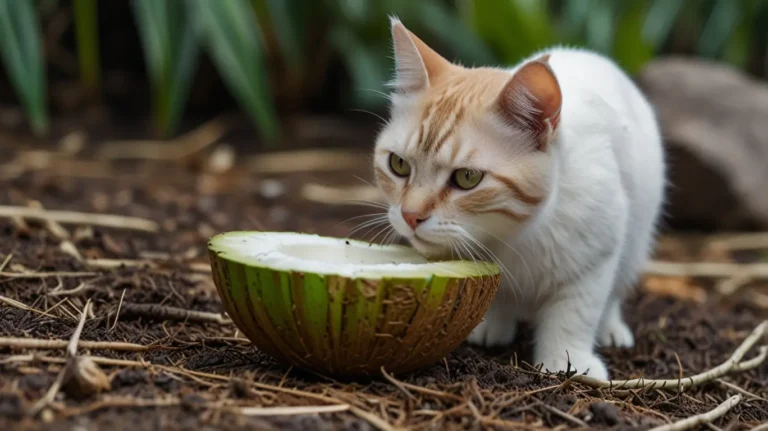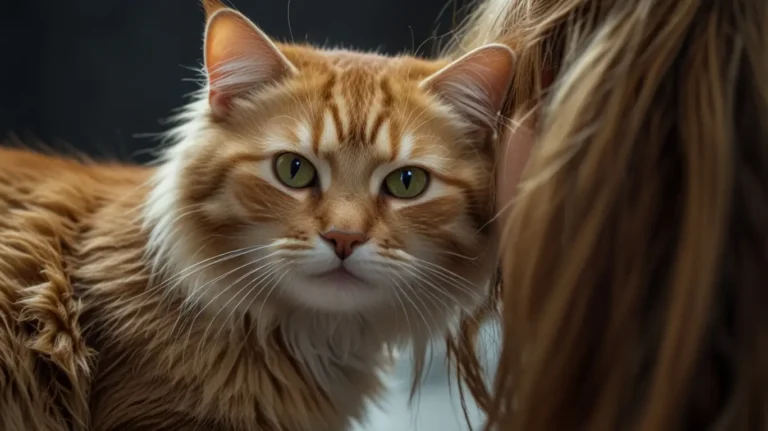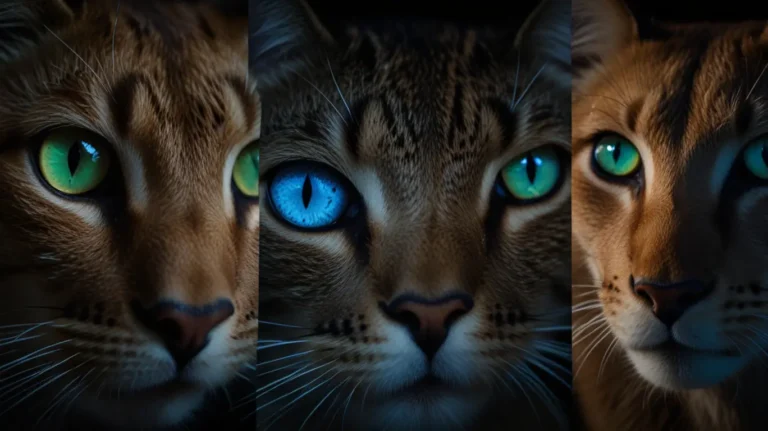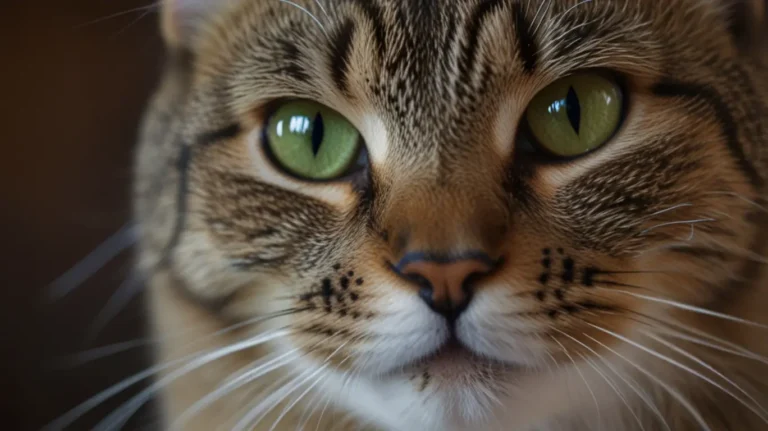Think Before Feeding Avocado To Your Feline Friend – Detailed Guide!
Cats are curious creatures with unique tastes, and some may be drawn to the creamy texture and mild flavor of avocados. But have you ever wondered why? Is it the smooth texture, the rich taste, or perhaps something more instinctual?
As cat owners, we often ponder: can a cat eat avocado safely? Before you offer a slice to your feline friend, let’s delve into what makes avocados appealing to cats and whether they’re actually good for them. Are there any benefits, or could it be a hidden risk? Let’s find out!
Key Takeaways:
- Understanding Avocado Curiosity: Why cats might be attracted to avocados.
- Safety Concerns: Can a cat eat avocado, and is it safe?
- Portion Control: How much avocado is safe for your cat to eat?
- Potential Health Benefits: Exploring the nutritional value of avocado for cats.
- Feeding Guidelines: How to safely introduce avocado to your cat’s diet.
Can a Cat Eat Avocado?
The question, can a cat eat avocado? is more common than you might think among cat owners. Although avocados are rich in nutrients that are good for humans, they may not be suitable for cats. Cats can safely consume modest amounts of avocado pulp as it is generally not poisonous. It’s crucial to keep in mind, though, that avocados also contain a chemical known as persin in their skin, seeds, and leaves.
See also Can Cats Eat Spinach?
Cats may get toxically exposed to persin, which may result in vomiting, diarrhea, and, in extreme situations, pancreatitis or other digestive problems. Therefore, if your cat expresses interest in avocados, make sure they only eat the pulp, and only in little amounts. Prior to giving your pet new foods, always get advice from your veterinarian.
How Much Avocado Can a Cat Eat?
Moderation is essential when determining how much avocado a cat can consume. The avocado’s flesh is the safest portion, although only very small amounts of it should be consumed. It only takes a tiny, bite-sized portion. Although beneficial for humans, avocados’ high fat content is not the best for cats and might cause weight gain or upset stomach if ingested frequently.
Additionally, the excessive fat content may contribute to pancreatitis, a dangerous condition that needs immediate veterinary attention. To reduce these risks, you should only offer avocado to your cat occasionally rather than as a main meal. Remember that the dietary needs of cats differ from those of people, and that many human food selections are inappropriate for their digestive systems.
If you decide to let your cat try avocado, the serving should be minimal. Here’s a guideline on how to manage portions:
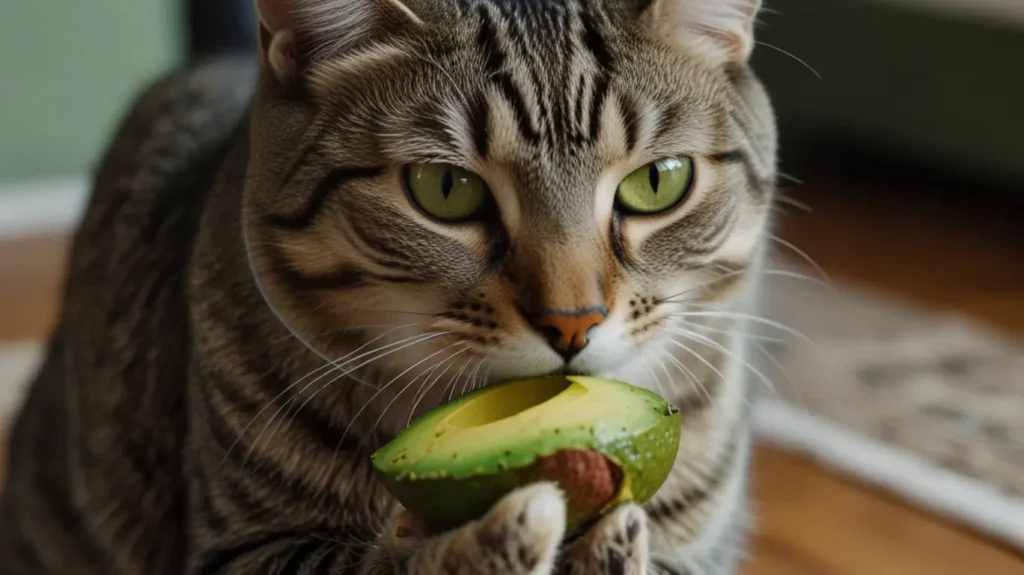
- Tiny Tastes Only: Offer a small piece, about the size of a pea, to see if your cat even likes it.
- No More Than Once a Week: Avocado should not become a regular part of their diet.
- Monitor for Reactions: After feeding, monitor your cat for signs of stomach problems or allergic reactions.
- Stick to the Flesh: Avoid giving any part of the skin, pit, or leaves.
- Balanced Diet: Remember that avocados are not necessary for your cat’s diet. Prioritize their regular cat food.
See also Can Cats Eat Coconut?
Avocados should be an occasional treat at most. Can a cat eat avocado frequently? Definitely not. Stick to the rule of moderation to ensure your cat stays healthy and happy.
Health Benefits of Avocado for Your Cat
Although the debate over “can a cat eat avocado?” usually focuses on the dangers, there may be some health advantages when consumed in moderation. Vitamins A, E, and B6 found in avocado flesh can support good skin and coat maintenance. Antioxidants found in avocados may also support immune system performance. Monounsaturated fats can be beneficial for vitality and coat shine in small doses, but they can also be toxic in large amounts.
However, these benefits are not exclusive to avocados and can be found in many cat-safe foods. Therefore, while a very small amount of avocado flesh might provide some nutritional perks, it’s not essential and should never be a primary source of these nutrients in your cat’s diet.
While avocados are packed with nutrients beneficial to humans, some of these can also provide health benefits to cats in very small amounts:
- Good Fats: The monounsaturated fats included in avocados may help your cat’s skin and coat stay healthier.
- Vitamins: They contain vitamins like E, which may benefit your cat’s immune system because of its antioxidant qualities.
- Fiber Content: A tiny bit of fiber from avocado can aid in your cat’s digestion.
- Potassium: This mineral supports various bodily functions in cats, including nerve and muscle function.
- Low in Sugar: Avocados have a low sugar content, which is suitable for cats who need to avoid sugary foods.
However, remember that these potential benefits do not outweigh the risks of overfeeding avocado to your cat. Can a cat eat avocado and gain health benefits? Yes, but the risks of overfeeding make it more sensible to stick to other cat-friendly foods.
How to Feed Avocado to Your Cat?
If you decide to feed avocado to your cat, it is crucial to do it safely. Start by ensuring the avocado is ripe and carefully remove the skin and pit, which contain persin, a compound harmful to cats. Only offer a tiny portion of the flesh—no larger than a small fingertip-sized piece. Mash it up to make it easier for your cat to eat and mix it with their regular food to ensure they’re not consuming too much.
Keep a watchful eye on your cat for any signs of pain or allergies. If your cat have any symptoms like as vomiting or diarrhea, stop feeding avocado right away and visit your veterinarian. Remember, the ideal way to serve avocado is in moderation and as an occasional treat.
If you’ve decided to introduce avocado to your cat’s diet, here’s how you can do it safely:
- Choose a Ripe Avocado: Make sure it’s fresh and ripe. Overripe avocados can have increased levels of persin.
- Prepare a Small Portion: Remove the skin and pit, which contain most of the persin, and only use the flesh.
- Mash or Cut into Small Pieces: Mash or cut your cat’s food into little pieces to make it easier to eat and limit the chance of choking.
- Mix with Regular Food: Blend a small bit of avocado into your cat’s regular diet to ensure it is not overpowering or odd for them.
- Watch for Adverse Reactions: After feeding, thoroughly observe your cat for any signs of an allergic response or digestive problems.
See also can cats eat pickles
By following these steps, you can introduce avocado to your cat’s diet in the safest way possible. Can a cat eat avocado safely? Yes, if prepared and served correctly.
What Human Foods Can Cats Eat?
Cats are obligate carnivores, which implies their diet is largely meat. However, when consumed in moderation, some human meals can be healthy and even beneficial. For example, basic, unseasoned cooked chicken or turkey can be a decent source of protein. Small servings of cooked carrots, peas, and pumpkin can provide fiber and minerals. Blueberries and melons can be consumed in moderation and contain antioxidants.
On the other hand, foods such as chocolate, onions, garlic, grapes, and raisins are harmful to cats and should never be fed. Before introducing any new food, always with your veterinarian to ensure that it is safe and acceptable for your pet. Some human foods, however, can be safe for cats when consumed in moderation. This is a quick guide:
| Human Food | Can Cats Eat It? |
|---|---|
| Cooked Chicken | Yes |
| Cooked Fish | Yes |
| Plain Rice | Yes, in small amounts |
| Cheese | Yes, but in moderation |
| Carrots | Yes, but in small amounts |
| Grapes/Raisins | No, toxic to cats |
| Chocolate | No, toxic to cats |
| Garlic and Onion | No, toxic to cats |
What to Do If Your Cat Eats Avocado?
If your cat accidentally eats avocado, keep a close eye on it. If it only eats a small portion of the pulp, it shouldn’t have any problems, but keep an eye out for any digestive problems, such as vomiting or diarrhea. If it has eaten the peel, seeds, or leaves, contact your vet immediately, as these parts are more likely to cause poisoning.
Avocado poisoning causes vomiting, diarrhea, shortness of breath, and fatigue. Quick action can prevent more serious health problems, so contact a professional if you think your cat has eaten a dangerous part of an avocado. If your cat accidentally eats too much avocado or eats the peel, seeds, or leaves, it’s important to take immediate action:

- Check for Symptoms: Watch for vomiting, diarrhea, or signs of discomfort.
- Contact Your Veterinarian: Contact your veterinarian for help, especially if your cat exhibits any symptoms.
- Induce Vomiting (If Advised): Sometimes, a vet may recommend inducing vomiting if the cat ate a large quantity recently.
- Monitor: Keep a close eye on your cat for at least 24 hours to ensure there are no lingering effects.
See also Are Orchids Dangerous For Cats?
In most cases, if a cat has only ingested a small amount of the flesh, they will be fine. However, always consult your vet to be sure.
FAQs About Can a Cat Eat Avocado
Are Avocados Not Good For Cats?
Avocados are not typically recommended for cats due to the persin content in the skin, pit, and leaves.
Is avocado good for cats?
In very small amounts, the flesh of avocado can be safe, but it’s not necessary or particularly beneficial for cats.
Can Cats Eat Avocado Skin?
No, avocado skin contains persin and can be toxic to cats.
Can Cats Eat Avocado Leaves?
No, avocado leaves are toxic to cats and should be avoided.
Can Cats Have Avocado Flesh?
Yes, in very small amounts, the flesh is the safest part but should be given sparingly.
Are Avocado Plants Toxic To Cats?
Yes, all parts of the avocado plant can be toxic to cats if ingested.
Can Cats Have Avocado Oil?
Avocado oil may be safe in tiny amounts but is generally not recommended due to the risk of persin and other potential digestive issues.
Closing Thoughts
So can a cat eat avocado? Although a small amount of avocado tissue is unlikely to harm your cat, exercise caution. Avocado skin and pits should be avoided entirely as they contain persin, which can be toxic in large quantities. When introducing new food to your cat’s diet, always introduce it gradually and keep an eye out for any hostile reactions.
See also Can Cats Have Artichokes?
Concentrate on your cat’s health by sticking to a balanced diet specifically designed to meet your cat’s nutritional needs.



